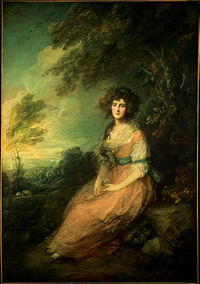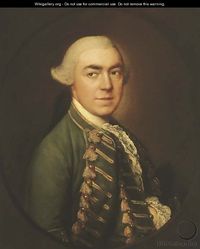Annotation:Maid of Bath (The): Difference between revisions
No edit summary |
m (Text replacement - "garamond, serif" to "sans-serif") |
||
| (8 intermediate revisions by one other user not shown) | |||
| Line 1: | Line 1: | ||
'''Back to [[{{BASEPAGENAME}}]]''' | '''Back to [[{{BASEPAGENAME}}]]''' | ||
---- | ---- | ||
<p><font face=" | <p><font face="sans-serif" size="4"> | ||
'''MAID OF BATH, THE.''' English, Jig. A Major. Standard tuning (fiddle). AABB. The melody was originally published in Charles and Samuel Thompson's '''Compleat Collection''', vol. 3 (London, 1773), followed by an appearance in Longman, Lukey & Broderip's '''Bride's Favourite Collection of 200 Select Country Dances''' (London, 1775). As with numerous other tunes from the Thompsons' 1773 collection, "Maid of Bath" was entered into the 1788 music manuscript copybook of fiddlers John and William Pitt Turner (Norwich, Conn.). | '''MAID OF BATH, THE.''' English, Jig. A Major. Standard tuning (fiddle). AABB. The melody was originally published in Charles and Samuel Thompson's '''Compleat Collection''', vol. 3 (London, 1773), followed by an appearance in Longman, Lukey & Broderip's '''Bride's Favourite Collection of 200 Select Country Dances''' (London, 1775). As with numerous other tunes from the Thompsons' 1773 collection, "Maid of Bath" was entered into the 1788 music manuscript copybook of fiddlers John and William Pitt Turner (Norwich, Conn.). | ||
<br> | <br> | ||
<br> | <br> | ||
'''The Maid of Bath''' was a three-act comedy by dramatist Samuel Foote, | [[File:linley.jpg|200px|thumb|left|Mrs. Richard Brinsley Sheridan (Elizabeth Linely), aged 31, by Thomas Gainsborough]] | ||
< | '''The Maid of Bath''' was a three-act comedy by dramatist Samuel Foote [http://en.wikipedia.org/wiki/Samuel_Foote] (1720-1777), that premiered at the Haymarket in 1771. Douglas Howard, writing in the '''Dictionary of Literary Biography, Volume 89: Restoration and Eighteenth-Century Dramatists, Third Series''' (1989) remarks: | ||
< | <blockquote> | ||
''The play is highly topical and was eagerly awaited by the London audience. It is the story of Kitty Linnet, a beautiful young'' ''woman whose parents insist on marrying her to the aging but wealthy Solomon Flint. As usual, Foote's dramatic situations'' ''reflected contemporary events, in this instance the case of Elizabeth Linley, an actual maid of Bath whose parents attempted a'' ''forced match of their daughter with Sir Walter Long, a man old enough to be her grandfather. The Maid of Bath, which opened on'' ''26 June 1771, was an immediate critical and popular success. Its favorable reception was largely attributable to the cause'' ''célèbre on which Foote drew, and not on the quality of the play itself. Untouched by the scandal it reports, modern readers'' ''find it less remarkable than did Foote's original audience.'' | |||
</blockquote> | |||
[[File:foote.jpg|200px|thumb|right|Samuel Foote]] | |||
A year after the play Elizabeth Linley [http://en.wikipedia.org/wiki/Elizabeth_Ann_Linley] (1754-1792) was forced to elope with another playwright and poet, Richard Brinsley Sheridan, fleeing with him to France. Her parents tried to have the marriage annulled as they were both underage, but they acquiesced to the union a few months later. She was painted by Gainsborough at least four times and twice by Reynolds. | |||
</font></p> | </font></p> | ||
<p><font face=" | <p><font face="sans-serif" size="4"> | ||
''Source for notated version'': | ''Source for notated version'': | ||
<br> | <br> | ||
<br> | <br> | ||
</font></p> | </font></p> | ||
<p><font face=" | <p><font face="sans-serif" size="4"> | ||
''Printed sources'': Thompson ('''Compleat Collection of 200 Favourite Country Dances, vol. 3'''), 1773; No. 192. | ''Printed sources'': Thompson ('''Compleat Collection of 200 Favourite Country Dances, vol. 3'''), 1773; No. 192. | ||
<br> | <br> | ||
<br> | <br> | ||
</font></p> | </font></p> | ||
<p><font face=" | <p><font face="sans-serif" size="4"> | ||
''Recorded sources'': <font color=teal></font> | ''Recorded sources'': <font color=teal></font> | ||
</font></p> | </font></p> | ||
Latest revision as of 14:18, 6 May 2019
Back to Maid of Bath (The)
MAID OF BATH, THE. English, Jig. A Major. Standard tuning (fiddle). AABB. The melody was originally published in Charles and Samuel Thompson's Compleat Collection, vol. 3 (London, 1773), followed by an appearance in Longman, Lukey & Broderip's Bride's Favourite Collection of 200 Select Country Dances (London, 1775). As with numerous other tunes from the Thompsons' 1773 collection, "Maid of Bath" was entered into the 1788 music manuscript copybook of fiddlers John and William Pitt Turner (Norwich, Conn.).

The Maid of Bath was a three-act comedy by dramatist Samuel Foote [1] (1720-1777), that premiered at the Haymarket in 1771. Douglas Howard, writing in the Dictionary of Literary Biography, Volume 89: Restoration and Eighteenth-Century Dramatists, Third Series (1989) remarks:
The play is highly topical and was eagerly awaited by the London audience. It is the story of Kitty Linnet, a beautiful young woman whose parents insist on marrying her to the aging but wealthy Solomon Flint. As usual, Foote's dramatic situations reflected contemporary events, in this instance the case of Elizabeth Linley, an actual maid of Bath whose parents attempted a forced match of their daughter with Sir Walter Long, a man old enough to be her grandfather. The Maid of Bath, which opened on 26 June 1771, was an immediate critical and popular success. Its favorable reception was largely attributable to the cause célèbre on which Foote drew, and not on the quality of the play itself. Untouched by the scandal it reports, modern readers find it less remarkable than did Foote's original audience.

A year after the play Elizabeth Linley [2] (1754-1792) was forced to elope with another playwright and poet, Richard Brinsley Sheridan, fleeing with him to France. Her parents tried to have the marriage annulled as they were both underage, but they acquiesced to the union a few months later. She was painted by Gainsborough at least four times and twice by Reynolds.
Source for notated version:
Printed sources: Thompson (Compleat Collection of 200 Favourite Country Dances, vol. 3), 1773; No. 192.
Recorded sources:
Back to Maid of Bath (The)
